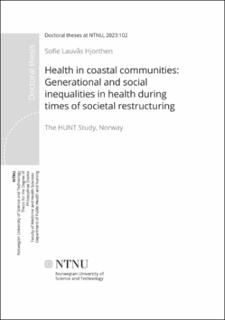| dc.contributor.advisor | Krokstad, Steinar | |
| dc.contributor.advisor | Sund, Erik Reidar | |
| dc.contributor.author | Hjorthen, Sofie Lauvås | |
| dc.date.accessioned | 2023-04-21T11:41:43Z | |
| dc.date.available | 2023-04-21T11:41:43Z | |
| dc.date.issued | 2023 | |
| dc.identifier.isbn | 978-82-326-6920-2 | |
| dc.identifier.issn | 2703-8084 | |
| dc.identifier.uri | https://hdl.handle.net/11250/3064253 | |
| dc.description.abstract | Background and aims: In the latter decades of the 20th century, many small-scale fisheries worldwide have decreased or disappeared. Important driving forces behind this development are overfishing, climate change and neoliberal policy shifts in fishing. This decline is seen in Norway, where many rural coastal communities have undergone a substantial societal restructuring due to plummeting fish stocks, new aquatic regulations and a substantial decrease in the fishing fleet concurrent with technological development in fishing gear.
Societal restructuring can be intertwined with the health of its population. Therefore, the observed decline in a crucial industry in Norwegian coastal communities can be considered a natural experiment at the population level and is therefore of significant interest for socialepidemiological studies. Present knowledge on the health of coastal populations during the fishing industry restructuring is limited. Thus, the overall aim of this thesis is to examine the health situation and decennial health trends in a Norwegian rural coastal population with a former dependence on small-scale fishing. The specific aims of this thesis are to examine the association of geographical affiliation and self-rated health as well as investigate the contributions of employment, behavioural and psychosocial factors to this association (Paper I); to study trends in self-rated health in three generations over four decades (Paper II) as well as trends in absolute and relative educational inequalities in self-rated health (Paper III) in a rural coastal population and compare findings with adjacent areas.
Methods: The data were obtained from four cycles of The Trøndelag Health Study (The HUNT Study), a population-based cross-sectional health survey conducted in the northern part of Trøndelag County in Central Norway. The four cycles of data collection occurred in 1984–1986 (HUNT1), 1995–1997 (HUNT2), 2006–2008 (HUNT3) and 2017–2019 (HUNT4). In all three papers, the study population were classified as either rural coast, urban coast, rural fjord or rural inland inhabitants. The outcome in the three papers was self-rated health (dichotomised into good and poor self-rated health). Paper I is a cross-sectional study (HUNT3) based on logistic regression and includes participants aged 20 years and older. Papers II and III are repeated cross-sectional studies (HUNT1–HUNT4) based on Poisson regressions and include participants aged 20 and 30 years and older, respectively.
Results: The rural coastal population exhibited greater odds of reporting poor self-rated health than those in other areas (urban coast, rural inland and rural fjord). This finding remained when simultaneously controlling for age and gender as well as employment, behavioural and psychosocial factors. Of the employment, behavioural and psychosocial factors, behavioural factors were found to contribute most to poor rural coastal self-rated health, closely followed by employment factors. Nevertheless, the majority of the association between rural coastal affiliation and poor health remains after controlling for these factors. The rural coastal population exhibited a higher predicted prevalence of poor self-rated health in adults and the elderly compared with those in adjacent geographical areas across the four decades. However, the health gaps narrowed between the rural coastal population and the adjacent populations in these age groups over the course of the HUNT surveys. Developments in educational inequalities in self-rated health were generally more favourable in the rural coastal population; relative educational inequalities in self-rated health have decreased steadily in the rural coastal population over the course of the HUNT surveys.
Conclusions: The rural coastal areas studied in this thesis have undergone substantial societal restructuring following the decline in small-scale fishing. Findings reveal that the rural coastal population exhibited poorer health than those in other areas across the four decades of this study. Nonetheless, the health of the rural coastal population has improved and health gaps between areas have narrowed. Moreover, educational inequalities in health have decreased in this rural coastal population. Although one cannot attribute the improvement in rural coastal health to specific restructuring processes, the shift from small-scale fishing to alternative employment opportunities may have improved the general working conditions for many inhabitants in these areas. | en_US |
| dc.language.iso | eng | en_US |
| dc.publisher | NTNU | en_US |
| dc.relation.ispartofseries | Doctoral theses at NTNU;2023:102 | |
| dc.relation.haspart | Paper 1:
Hjorthen, Sofie Lauvås; Sund, Erik; Skalicka, Vera; Krokstad, Steinar.
Understanding coastal public health: Employment, behavioural and psychosocial factors associated with geographical inequalities. The HUNT study, Norway. Social Science and Medicine 2020 ;Volum 264. s. 1-10
https://doi.org/10.1016/j.socscimed.2020.113286
This is an open access article under the CC BY license (http://creativecommons.org/licenses/by/4.0/) | |
| dc.relation.haspart | Paper 2:
Hjorthen, Sofie Lauvås; Sund, Erik; Kjørholt, Anne Trine; Engevold, Miriam Hjeldsbakken; Krokstad, Steinar.
Public health in restructuring coastal communities: Generational trends in self-rated health following the decline in small-scale fishing. The HUNT study, Norway. Journal of Rural Studies 2021 ;Volum 88. s. 307-316
https://doi.org/10.1016/j.jrurstud.2021.08.013
This is an open access article under the CC BY license (http://creativecommons.org/licenses/by/4.0/) | |
| dc.relation.haspart | Paper 3:
Hjorthen, Sofie Lauvås; Sund, Erik R.; Skalicka, Vera; Eikemo, Terje Andreas; Getz, Linn Okkenhaug; Krokstad, Steinar.
Trends in absolute and relative educational inequalities in health during times of labour market restructuring in coastal areas: The HUNT Study, Norway. Social Science and Medicine 2022 ;Volum 292.
https://doi.org/10.1016/j.socscimed.2021.114541
This is an open access article under the CC BY license (http://creativecommons.org/licenses/by/4.0/) | |
| dc.title | Health in coastal communities: Generational and social inequalities in health during times of societal restructuring. The HUNT Study, Norway | en_US |
| dc.type | Doctoral thesis | en_US |
| dc.subject.nsi | VDP::Medisinske Fag: 700::Helsefag: 800 | en_US |
| dc.description.localcode | Fulltext not available | en_US |
